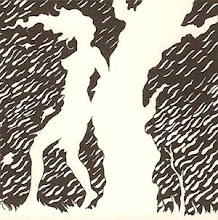Comics. Graphic Novels. Graphic Narrative.
The medium of comics is not exactly foreign to me, I enjoyed "Garfield", "Calvin and Hobbes", and "Peanuts" as a child. Working at a bookstore I picked a manga here and there, even got relatively involved in two series: "Mouse Guard" and "Y:The Last Man".
But every time I would step foot into a Comics Shop or find myself conversing with friends about comics I would just as quickly try and find an exit. I didn't know enough to really belong to the world or current conversations going on about Comics.
I was at a lost.
But then I w
 as introduced to two comics that changed my thinking.
as introduced to two comics that changed my thinking.If you have found your way to my tiny blog and have not read Art Spiegelman's "Maus" I suggest you close your web-browser, take a trip to your local library, and clear a day or two of things to do. This graphic narrative opened not only my eyes, but the world's eyes to the importance and relevance of the medium. I cried, I sat in stunned silence, I left this narrative a changed woman. I won't go into the synopsis more than to say it is a dipiction or rendering of Spiegelman's journey to understand his father and the
atrocities of the Holocaust, but the affect it has on most of its readers is enough to change their minds on what comics are exactly.

(Cover from Art Spiegelman's "Maus: A Survivor's Tale. Book I: My Father Bleeds History")
The second eye-opner was a recomendation of a friend. Craig Thompson's "Blankets" hit me in a different way, but in a no less important way, than "Maus". Thompson's illustation and writing style felt familiar, it was if the honesty of his emotions and thought were rendering clearly through the ink on the page. In the simplest sense "Blankets" is about Thompson coming of age and falling in love for the first time. But like most "coming of age"tales, that phrase doesn't do it justice. I remember being a freshman in college. It was winter in Ohio and I was trapped in my dormroom alone for the weekend. I picked up a copy of the work a friend had leant me and begain flipping through. Next thing I knew it was dark outside and as I closed the book the snow was falling all around. If you have ever read "Blankets" you will understand what a surreal moment it was.
(Cover from Craig Thompson's "Blankets")
These two works did more than anything else to help me understand that the term "Comics" is, like most definitions of literary or artistic movements", a broad term. When you think of the classic comic, the first image is most likely the superhero: Superman, Spiderman, X-Men, Batman. I think this common view of comics is what prevents a majority of would-be readers, especially women, from even exploring the medium. From a personal viewpoint, I always considered the majority of comics to be "boy only comics". I recognize this is a limited perspective but I think it's a valid one. Most "mainstream" comics feature very masculine men, often time participating in very masculinized situations such as fighting, driving fast cars, rescuing "damsels in distress", etc. Without much knowledge of the medium I decided early on that there were no comics that really spoke to me or my experience as a woman. Most of the comics that had female characteers, Superwoman, Lois Lane, Mary Jane, Spidergirl, Catwoman, etc. were dipictions of this ultra-sexy "bad-ass" with large breasts, huge thighs, and tight clothes. They also seemed to only be important in terms of the male character, either as a side kick, love interest, anamoly, or arch-villianess.
But this opinnion, while I think describes why many women tend to shy away for comics in general, is one sided. The world of comics is huge. Yes, mainstream superhero comics are one part of the Comics world, but graphic narratives and novels like "Maus" and "Blankets" have done wonders for showing the world how broad and how relevant comics are for everytype of person; men, women, children, teens, and everything in-between.
This blog aims to be a documentation of my journey into the world of comics. It coincides with a college course on the graphic narrative, so I'm hoping to include relevant discussions that occur in and out of the classroom. Most importantly this blog is for graphic novice. The Graphic Neophyte aims to help you out there who are curious or unsure about comics. I am no expert, as a beginner I am just begining to learn the language and technique of the medium. But I'm hoping through this blog and the course on the graphic narrative I may be able to make some sense or relative commentary on the amazing world of Comics.
Hell, maybe all these superhero's will convence me I need to go to the gym....
Until next time,
GN

(image from David Peterson's "Mouse Guard" )
